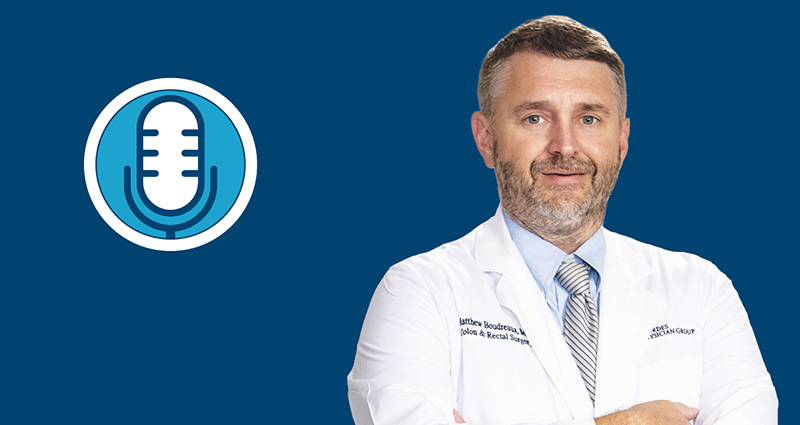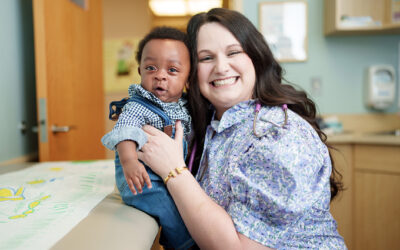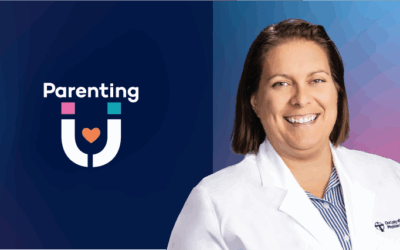Although it’s not the prettiest topic, it’s crucial to talk about colorectal care. Colorectal cancer is the third most common cancer diagnosed in the U.S., according to the American Cancer Society.
Matthew Boudreaux, MD, colon and rectal surgeon with Our Lady of Lourdes Health, helps us understand colorectal cancer and its prevention and treatment.
Don’t Wait for Signs and Symptoms
Colon cancer is a slow-growing cancer, and it can take years before a patient notices any signs or symptoms. Those symptoms include abdominal pain, changes in bowel habits, fatigue and blood in the stool. But, blood in the stool does not necessarily mean you have colon cancer. In fact, most rectal bleeding is caused by hemorrhoids.
“Get off the internet and stop Googling your symptoms,” Dr. Boudreaux says. “If you feel like something is not right, trust your gut and go see your doctor.”
The good news is that preventive screenings for colorectal conditions are effective: “100%, the most important thing is to get your colonoscopy.”
Colorectal Cancer Risk Factors
Colon cancer is more prevalent in people over age 65, but in the last two decades the average age has started to drop. The American Cancer Society recommends colorectal cancer screenings start at age 45.
In addition to age, other factors that may increase your risk for colon cancer include a family history and your own history of having a polyp on a previous colonoscopy. A poor diet — one that’s low in fiber, high in fat — can also increase your risk.
“That’s the South Louisiana diet right there,” Dr. Boudreaux says. “We do not eat healthy here.” He recommends small changes: eat a little bit healthier, eat out less often, eat less red meat and a little more fiber, cook at home a little more often. “Everything in moderation is what I like to say.”
A sedentary lifestyle is a risk factor for all cancers, as is smoking and alcohol use.
“People in South Louisiana love to drink, and I always tell them – you can’t drink a six pack a day, do a six pack a week,” Dr. Boudreaux says.
A large study done in Louisiana found that people in Acadiana had the highest incidents of colon cancer in the state. “If you’re a Cajun person in Acadiana, you’ve got to get your colonoscopy.”
Breaking the Stigma: What to Expect at Your Colonoscopy
Fear of colonoscopy shouldn’t keep you from completing the screening. Although it isn’t pleasant, regularly having it done is necessary. Colonoscopies can prevent cancer by finding and removing pre-cancerous polyps before they have a chance to grow.
“My job is to put them at ease,” Dr. Boudreaux says of patients who are referred to him for a colonoscopy. “It’s actually something that’s very simple. The worst part is the day and night before.”
The prep is a liquid diet the day before and drinking a solution to clear out your bowels starting around 4 p.m., which means being in the bathroom often.
“If you can get through that day and evening before, the day of the procedure is so easy,” Dr. Boudreaux says. A colonoscopy is an outpatient procedure, and he says having the IV placed is the worst part. “You’re out enough to comfortably undergo the colonoscopy, and once you’re awake your doctor or nurse practitioner will tell you what they found.”
Colonoscopies are often scheduled in the morning, with most patients home by lunchtime. It’s possible to only need to miss one day of work.
What Colonoscopies Can Uncover
The best treatment for colon cancer is prevention, which can happen with regular colonoscopies.
“We’re looking for masses and polyps and things like that,” Dr. Boudreaux explains. “Most of the time we find small polyps between 3 and 5 millimeters that are easily removed during the colonoscopy.”
Even much larger polyps can be removed during the procedure. A polyp that’s too large to remove doesn’t necessarily mean it’s cancer. A separate surgical procedure will be scheduled to remove it.
“When we get in there and find large cancers, that’s when it becomes complicated,” Dr. Boudreaux says.
Colon Cancer Treatment
The first treatment for colon cancer is typically surgery to remove the tumor.
Once cancer is detected, the patient will have a CAT scan to be sure it hasn’t spread. If it hasn’t, the patient will have surgery within a couple weeks, and most are back and working within three to six weeks.
“I love taking colon cancer out of people because we can cure them, but I also don’t like it because those conversations are so hard,” Dr. Boudreaux says.
Whether a patient needs other therapies to treat the tumor depends on the cancer’s stage.
Colon Cancer Stages
Stage 1 and 2 colon cancer means that the tumor is confined to the colon. It may be penetrating the wall of the colon but it hasn’t spread elsewhere. Stage 1 and 2 colon cancers do not need chemotherapy.
Stage 3 colon cancer means it has left the colon and spread to lymph nodes. An oncologist will help devise a treatment plan that likely includes surgery and chemotherapy.
Stage 4 colon cancer means the cancer has spread beyond lymph nodes to another organ or organs. The survival rate drops dramatically, but a treatment plan is devised.
The Marathon of Rectal Cancer
Dr. Boudreaux likens colon cancer to a sprint – for early stage patients they can get a diagnosis, bloodwork, CAT scan and surgery within a month. Rectal cancer is more like a marathon. From the day of diagnosis to the final day of chemotherapy can be a year or sometimes even longer.
Listening as a Key Part of Patient Care
As a healthcare provider, Dr. Boudreaux reads a lot to stay up to date on the latest medical education. “To be honest with you, more of what I’m reading and what I’m listening to does not have to do with colon cancer. It has to do with many other things that are interrelated, and a lot of it is patient care,” he says.
Patients who have colon or rectal cancer are at higher risk for other cancers and need to have additional tests and screenings.
“My job is not just to remove the cancer and adios,” Dr. Boudreaux says. Patients in his office who have cancer receive longer appointments. Usually, family members are with them and emotions are higher. “My job is to listen to them, and my job is to be as educated as I can so that I can give them the answers that they need.”
Sometimes that answer is “I don’t know” when it comes to why cancer happened to me.




